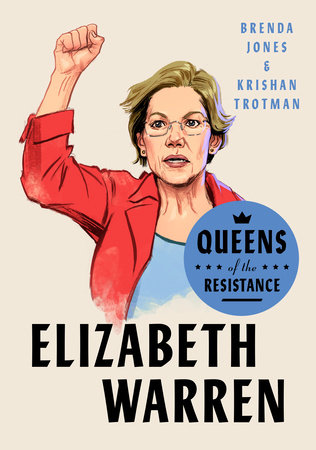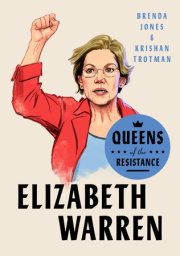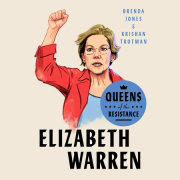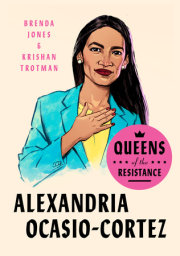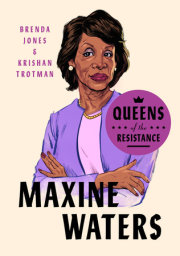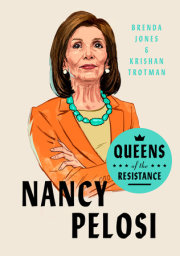THE TAO OF BETSY
I promise that you'll never find another like me.
-Taylor Swift, "ME!"
Elizabeth Warren is a five-foot-eight boss, a woman who starts the fight and wins it, an indisputable Queen of the Resistance. She has led the battle for the middle class since the 1960s. Warren has a plan, and she persists, honey. Snap. Snap-that's just how she rolls. She's a political samurai and will go after a meaningful cause like a bulldog after a bone. In any race or debate, she is a top contender. The Warren jogs out to the podium, appearing unassuming in a soft-knit, crayon-blue blazer and rimless glasses, but then suddenly she's throwing blows like Muhammad Ali-at rich politicians attempting to buy the presidency, big banks, and Wall Street, or men trying to dictate women's choices. Warren comes to slay and annihilate these dirty tricksters. She's also equally as excited to learn, eager to educate, and wants to touch the beating heart of the American people. But don't be fooled by this skinny little girl from Norman, Oklahoma. Warren can land a swing, like a Balboa, to get her point across, and delivers politics for the knockout: facts, analysis, what's right, not wrong, for your nana's healthcare in West Palm Beach. She'll work you through an economics report with the skill and precision of a surgeon. Trump, beware. She's done the research, got the blueprints, and will undo you.
What makes her a feared opponent is her willingness to drill down to the facts in a way that only yo mama could do. Her research is deep and wide, and, trust me, she's got receipts. She'll read you on financial law and equity with such deep affection it'll sound like a romance novel. Your mind will be opened, you will see a new vision of what life could be in America. And she's effective, this force is a political heavyweight!
Just when you thought the "good guys" were dead-you know, the good guys who hurry in on white horses kicking up a cloud of dust ready to save the day? The same white men we see over and over again coming to the rescue-Thor, the Hulk, and Iron Man types, rockin' configurations of the Avengers, gathering their powers, ready to pounce back the forces of evil in a big showdown one more time? When the skies are particularly cloudy, and you find yourself mad at the universe, sick of the ongoing media headlines and news announcing a corrupt president has gotten off the hook yet again-including a 448-page report that suggest reason for impeachment-and you're wondering whether the proverbial good guys are tired, whipped, and tucked in bed, then you might take a long, hard, very serious look at Elizabeth Warren. She's no good guy; she's the best woman!
While most of us are lost in deep meditative thought, picking our noses or sipping our merlot trying to figure out why our hard work can't seem to put us ahead, Elizabeth "Betsy" Warren has been investigating those same questions for us and configuring answers about what happened to the American dream for the last forty years. And she's also been trying to do something about it for the last forty years. . . . That sort of tenacity, bullish spirit, supernatural slay power makes you realize the good ol, guys coming to the rescue just might be the gals.
She has been listening in to American life like a studious internist for decades, to find causes and effects, to gather data, draw conclusions, and develop her own form of quantitative easing. She's taken the stethoscope of her mind and carefully examined the American chest, its labored breathing, its sputtering and wheezing. She has been sounding the alarm, trying to tell us in her own professorial way how to fix our systems, and why all that's wrong might not be our fault. Warren's no diva, no duchess wannabe. There's no airs about Warren. She'd chug a beer before sipping wine. She's busy. There's work to be done and this queen is determined to do it.
So where did this Queen of the Resistance come from?
She's Betsy Herring. That's what her mama called her. Her daddy was Don Herring and her mother was born Pauline "Polly" Reed. Her parents grew up in a small town in Wetumka, Oklahoma. Her daddy's family owned a hardware store. After some difficulties in the family-more on that in a moment-Don wore many hats: he sold cars, fixed fences, and worked as a salesman at Montgomery Ward department store in the rug section. After the war, he and Pauline moved from place to place, one step ahead of the next bill collector and wherever Don could find work.
The Herrings had three boys, Don, John, and David . . . and when their sons were all nearly grown and about to leave home, in the summer of 1949, surprise, surprise! Baby Betsy was born on June 22, a Cancer-creative, thoughtful, emotional, and highly loyal and empathetic to others, according to the stars. Betsy's daddy dubbed her the whipped cream with "the cherry on top." Polly was thirty-seven, and had thought her childbirth days were over, but finally she got a girl. A girl she'd adorn with pink bows, sparkles, and red shoes. Hooray!
(Feminists, hush, Betsy would eventually put gender stereotypes on blast in her politics.)
Still, the Herrings were considered a middle-class family, and a surprise baby bundle of joy wasn't a threat to their livelihood. Despite the challenges he faced, Betsy's father was an idealist, dedicated to the dream of becoming the American suburban family emblem: two parents and a few kids, living on one income-her father's, of course. Her mother readily embraced the role of stay-at-home mom, which was typical at that time, otay. They owned a home in Norman, twenty miles south of Oklahoma City. The Herrings were no replica of The Truman Show or Stepford Wives. They were not rich, but for years they managed to hack it as homeowners and were considered middle-class; they had a stable footing with the seeds they'd planted. Her parents were able to buy their home with the help of a federal loan-Americans back then didn't need to be millionaires to succeed. Looking back at that time, Elizabeth Warren often remembers it fondly-sort of wistfully, like an Alice who had seen the magical flowers of Wonderland yet somehow they'd withered away.
But the stability she'd felt at home growing up was not to last.
In fact, it would briskly be pulled from under her in what felt like the blink of an eye, leaving a feeling that seeps at the feet of a terrible coming.
"YES, MISS BETSY, YOU CAN!"
I know I can be what I wanna be.
-Nas, "I Know I Can"
It was Elizabeth's second-grade teacher, Mrs. Lee, who first told her that she could in fact, "do something."
It was the 1950s, and women like Mrs. Lee were a mystery, a puzzle. She was "a woman with sturdy shoes, an ample bosom, and a surprisingly gravelly voice," as Warren described in her book This Fight Is Our Fight, but she was an enigma to young Betsy coming of age in a world where the worth of a woman was judged by how well she kept her home, the neatness of her children's appearance, her award-winning casseroles, and the longevity of her marriage. Some women had worked in factories during the war, but working was still largely considered a mandatory drudgery for single women, a penance for those who somehow missed the memo on how to get and keep a man-it was not a life to aspire to, Beyonce.
Being a housewife was the everyday luxury for neighborhood wives with respect and social standing. It was the goal of every little girl. This would become a concern for Betsy, fellow A-cups, and any tomboy who dared to show her true colors. Early on, Betsy knew that she did not have all the requisite requirements-sizing herself up in the mirror, a stark assessment made it clear she was not a Betty Grable or Marilyn Monroe. Somewhere in her heart, she wanted to be some guy's great catch too, but she felt her most compelling characteristic was her brain. And her mother didn't help, Warren said. "She fretted that I didn't do 'normal girl things' like trying on makeup or curling my hair, and she used to remind me not to wear my reading glasses."
But second-grade Betsy was fond of Mrs. Lee, who seemed to cast spells that made math fun, reading joyful, and her grade school classroom a magical place to be. Mrs. Lee led the class with grace and brilliance and gifted her students with both "smoky hugs" and a command for order. She challenged Betsy to think differently about who she was and fostered an environment where even a girl could "do something."
Betsy told Mrs. Lee that she'd become a teacher just like her when she grew up. She was one of the best readers in class, so Mrs. Lee put Betsy in charge of a reading group to help other students. There, she relished the power of teaching-the thrill it granted of watching her peers advance-and it continued on to the playground, where Betsy would shepherd other second graders into her imaginary classroom. She'd work her teaching magic at home too, where she'd hold rousing lectures in her bedroom for her dolls and teddy bears.
Mrs. Lee had created a North Star for Betsy, where the loftiest path a girl from the suburbs of Norman, Oklahoma, was supposed to take was to marry a boy. And though Betsy would sometimes lose sight of that star, Mrs. Lee's allure had already planted an uncommon seed in her mind: she could "do something." This new philosophy, this indestructible understanding would serve as a guide to Betsy for the rest of her life. She could be a badass, if she chose to.
It was in the halls of Wilson Elementary School with Mrs. Lee where she first learned that being "different" was not a handicap but her greatest power, and this new understanding elevated her out of mediocrity into a place of superiority. "I had [absorbed] the message that I was a pretty iffy case-not very pretty, not very flirty, and definitely not very good at making boys feel like they were smarter than I was." Education would be her big escape. Even at a young age, Betsy knew there was something gnawing at the center of her life, and it was sometimes painfully clear that she would never be the woman her mother had raised her to be. There is no way her parents could have known that America had turned a corner, that opportunities for women would abound for almost fifty years, that women would break through a glass ceiling that Pauline never even desired to see through, let alone bust out of, but change was coming. In fact, this movement had already begun, and Betsy Herring would one day reign as a Queen of the Resistance.
Young Betsy knew that education would be a driving force, a veritable race car ride out of Norman, Oklahoma. An education is a meal ticket, as Malcolm X said: "Education is the passport to the future, for tomorrow belongs to those who prepare for it today." In fact, education has been the primary mover toward change for women and people of color throughout history. In the 1950s and '60s, while Betsy was growing up after World War II, the government funneled more money into colleges and universities to help veterans returning home. Student loans and grants were made available to them and billions of dollars were poured into secondary schools for their education. This empowered Betsy's education and those of many middle-class families around the country. By the 1970s, when Betsy was seeking higher education, her commuter's college was only $50 per semester. Education would become a huge part of her political agenda. For years to come, she would continue to remember Mrs. Lee, especially as a member of the Senate education committee. But for now, she was just a little girl with a dream . . .
UNBREAKABLE
Life without dreaming is a life without meaning.
-Wale, "Aston Martin Music"
Things changed at home when Betsy's father had a heart attack. Sis, this is when the sand quickens, and a child's innocence begins to fog and is traded for awareness. Everyone has these moments when there's a hushed rumbling and the Earth slightly tilts, and things will never be the same. For Betsy it was when she was about to finish grade school. That day, her father had slid into a kitchen table chair, sunken and exhausted. Her mother called out for him to get up a few times but he couldn't. When they finally went to the hospital, the prognosis was clear. Betsy's father would survive, but he would never be quite the same. And neither would Elizabeth Warren.
In order to understand the heart of Elizabeth Warren, we must dive even deeper into the roots of where she comes from.
By the time they had Betsy, Don and Pauline Herring had survived just about every kind of disaster: ecological retribution, capitalism run amok, the complete breakdown of the world financial system, world war, and the threat of nuclear holocaust. Despite disaster moving at a glacial pace or at top speed, like the katana-wielding, zombie-killing Michonne in The Walking Dead, the Herrings always stayed resilient and never stopped fighting for a better life-a fight Betsy would one day take up for all Americans.
They were just twenty-one and nineteen years old, it was 1932 in Wetumka, Oklahoma, when Don and Pauline decided to elope, to the consternation of their parents-especially Don's, who disapproved of Pauline's family background. The conflict over his new bride ultimately cost Don his relationship with his parents, and with it the livelihood that the family store could provide. Still, they were young and in love, not totally oblivious to the ramifications of the Great Depression but full of youthful optimism that recovery was just around the corner. The couple took a hopeful leap together into the future.
Don and Pauline had dreams of their own. Elizabeth remembers family lore being populated with stories of Don, barely out of high school and rebuilding a two-passenger, open-cockpit airplane. Then somehow he taught himself how to fly. It was the time of the wizardry of the Wright brothers and the technological miracle of flight when a fearless Don would meander in circles over and over again in turquoise sky high over roving fields of wheat that spread like a golden band across the Oklahoma horizon. His favorite girl, Pauline, was bright, engaging, and she could sing like an angel. In fact, she could get lost in song, for hours, absorbed in lyrics and melody of starlit moonbeams and romantic reverie.
Copyright © 2020 by Brenda Jones. All rights reserved. No part of this excerpt may be reproduced or reprinted without permission in writing from the publisher.

